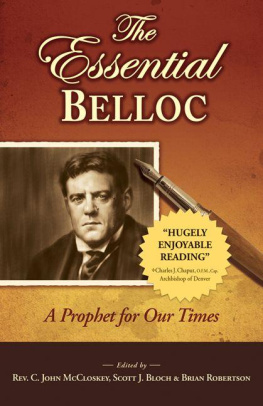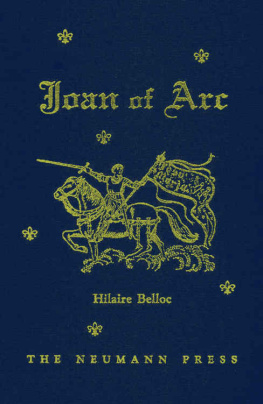Hilaire Belloc - First and Last
Here you can read online Hilaire Belloc - First and Last full text of the book (entire story) in english for free. Download pdf and epub, get meaning, cover and reviews about this ebook. year: 2015, publisher: CreateSpace Independent Publishing Platform, genre: Detective and thriller. Description of the work, (preface) as well as reviews are available. Best literature library LitArk.com created for fans of good reading and offers a wide selection of genres:
Romance novel
Science fiction
Adventure
Detective
Science
History
Home and family
Prose
Art
Politics
Computer
Non-fiction
Religion
Business
Children
Humor
Choose a favorite category and find really read worthwhile books. Enjoy immersion in the world of imagination, feel the emotions of the characters or learn something new for yourself, make an fascinating discovery.
- Book:First and Last
- Author:
- Publisher:CreateSpace Independent Publishing Platform
- Genre:
- Year:2015
- Rating:3 / 5
- Favourites:Add to favourites
- Your mark:
- 60
- 1
- 2
- 3
- 4
- 5
First and Last: summary, description and annotation
We offer to read an annotation, description, summary or preface (depends on what the author of the book "First and Last" wrote himself). If you haven't found the necessary information about the book — write in the comments, we will try to find it.
First and Last — read online for free the complete book (whole text) full work
Below is the text of the book, divided by pages. System saving the place of the last page read, allows you to conveniently read the book "First and Last" online for free, without having to search again every time where you left off. Put a bookmark, and you can go to the page where you finished reading at any time.
Font size:
Interval:
Bookmark:
Tonya Allen, Eric Eldred, Charles Franks, and the Online Distributed Proofreading Team
CONTENTS
Personally I should call it "Getting It up," but I have always seen it in print called "weighing anchor"--and if it is in print one must bow to it. It does weigh.
There are many ways of doing it. The best, like all good things, has gone for ever, and this best way was for a thing called a capstan to have sticking out from it, movable, and fitted into its upper rim, other things called capstan--bars. These, men would push singing a song, while on the top of the capstan sat a man playing the fiddle, or the flute, or some other instrument of music. You and I have seen it in pictures. Our sons will say that they wish they had seen it in pictures. Our sons' sons will say it is all a lie and was never in anything but the pictures, and they will explain it by some myth or other.
Another way is to take two turns of a rope round a donkey-engine, paying in and coiling while the engine clanks. And another way on smaller boats is a sort of jack arrangement by which you give little jerks to a ratchet and wheel, and at last It looses Its hold. Sometimes (in this last way) It will not loose Its hold at all.
Then there is a way of which I proudly boast that it is the only way I know, which is to go forward and haul at the line until It comes--or does not come. If It does not come, you will not be so cowardly or so mean as to miss your tide for such a trifle. You will cut the line and tie a float on and pray Heaven that into whatever place you run, that place will have moorings ready and free.
When a man weighs anchor in a little ship or a large one he does a jolly thing! He cuts himself off and he starts for freedom and for the chance of things. He pulls the jib a-weather, he leans to her slowly pulling round, he sees the wind getting into the mainsail, and he feels that she feels the helm. He has her on a slant of the wind, and he makes out between the harbour piers. I am supposing, for the sake of good luck, that it is not blowing bang down the harbour mouth, nor, for the matter of that, bang out of it. I am supposing, for the sake of good luck to this venture, that in weighing anchor you have the wind so that you can sail with it full and by, or freer still, right past the walls until you are well into the tide outside. You may tell me that you are so rich and your boat is so big that there have been times when you have anchored in the very open, and that all this does not apply to you. Why, then, your thoughts do not apply to me nor to the little boat I have in mind.
In the weighing of anchor and the taking of adventure and of the sea there is an exact parallel to anything that any man can do in the beginning of any human thing, from his momentous setting out upon his life in early manhood to the least decision of his present passing day. It is a very proper emblem of a beginning. It may lead him to that kind of muddle and set-back which attaches only to beginnings, or it may get him fairly into the weather, and yet he may find, a little way outside, that he has to run for it, or to beat back to harbour. Or, more generously, it may lead him to a long and steady cruise in which he shall find profit and make distant rivers and continue to increase his log by one good landfall after another. But the whole point of weighing anchor is that he has chosen his weather and his tide, and that he is setting out. The thing is done.
You will very commonly observe that, in land affairs, if good fortune follows a venture it is due to the marvellous excellence of its conductor, but if ill fortune, then to evil chance alone. Now, it is not so with the sea.
The sea drives truth into a man like salt. A coward cannot long pretend to be brave at sea, nor a fool to be wise, nor a prig to be a good companion, and any venture connected with the sea is full of venture and can pretend to be nothing more. Nevertheless there is a certain pride in keeping a course through different weathers, in making the best of a tide, in using cats' paws in a dull race, and, generally, in knowing how to handle the thing you steer and to judge the water and the wind. Just because men have to tell the truth once they get into tide water, what little is due to themselves in their success thereon they are proud of and acknowledge.
If your sailing venture goes well, sailing reader, take a just pride in it; there will be the less need for me to write, some few years hence, upon the art of picking up moorings, though I confess I would rather have written on that so far as the fun of writing was concerned. For picking up moorings is a far more tricky and amusing business than Getting It up. It differs with every conceivable circumstance of wind, and tide, and harbour, and rig, and freeboard, and light; and then there are so many stories to tell about it! As--how once a poor man picked up a rich man's moorings at Cowes and was visited by an aluminium boat, all splendid in the morning sun. Or again--how a stranger who had made Orford Haven (that very difficult place) on the very top of an equinoctial springtide, picked up a racing mark-buoy, taking it to be moorings, and dragged it with him all the way to Aldborough, and that right before the town of Orford, so making himself hateful to the Orford people.
But I digress....
There was in the regiment with which I served a man called Frocot, famous with his comrades because he had seen The Dead, for this experience, though common among the Scotch, is rare among the French, a sister nation. This man Frocot could neither write nor read, and was also the strongest man I ever knew. He was quite short and exceedingly broad, and he could break a penny with his hands, but this gift of strength, though young men value it so much, was thought little of compared with his perception of unseen things, for though the men, who were peasants, professed to laugh at it, and him, in their hearts they profoundly believed. It had been made clear to us that he could see and hear The Dead one night in January during a snowstorm, when he came in and woke me in barrack-room because he had heard the Loose Spur. Our spurs were not buckled on like the officers'; they were fixed into the heel of the boot, and if a nail loosened upon either side the spur dragged with an unmistakable noise. There was a sergeant who (for some reason) had one so loosened on the last night he had ever gone the rounds before his death, for in the morning as he came off guard he killed himself, and the story went about among the drivers that sometimes on stable guard in the thick of the night, when you watched all alone by the lantern (with your three comrades asleep in the straw of an empty stall), your blood would stop and your skin tauten at the sound of a loose spur dragging on the far side of the stable, in the dark. But though many had heard the story, and though some had pretended to find proof for it, I never knew a man to feel and know it except this man Frocot on that night. I remember him at the foot of my bed with his lantern waking me from the rooted sleep of bodily fatigue, standing there in his dark blue driver's coat and staring with terrible eyes. He had undoubtedly heard and seen, but whether of himself from within, imagining, or, as I rather believe, from without and influenced, it is impossible to say. He was rough and poor, and he came from the Forest of Ardennes.
The reason I remember him and write of him at this season is not, however, this particular and dreadful visitation of his, but a folly or a vision that befell him at this time of the year, now seventeen years ago; for he had Christmas leave and was on his way from garrison to his native place, and he was walking the last miles of the wood. It was the night before Christmas. It was clear, and there was no wind, but the sky was overcast with level clouds and the evening was very dark. He started unfed since the first meal of the day; it was dark three hours before he was up into the high wood. He met no one during all these miles, and his body and his mind were lonely; he hoped to press on and be at his father's door before two in the morning or perhaps at one. The night was so still that he heard no noise in the high wood, not even the rustling of a leaf or a twig crackling, and no animal ran in the undergrowth. The moss of the ride was silent under his heavy tread, but now and then the steel of his side-arm clicked against a metal button of the great cloak he wore. This sharp sound made him so conscious of himself that he seemed to fill that forest with his own presence and to be all that was, there or elsewhere. He was in a mood of unreal and not holy things. The mood, remaining, changed its aspect, and now he was so far from alone that all the trunks around him and the glimmers of sky between bare boughs held each a spirit of its own, and with the powerful imagination of the unlearned he could have spoken and held communion with the trees; but it would have an evil communion, for he felt this mood of his take on a further phase as he went deeper and deeper still into these forests. He felt about him uneasily the sense of doom. He was in that exaltation of fancy or dream when faint appeals are half heard far off, but not by our human ears, and when whatever attempts to pierce the armour of our mortality appeals to us by wailing and by despairing sighs. It seemed to him that most unhappy things passed near him in the air, and that the wood about him was full of sobbing. Then, again, he felt his own mind within him begin to be occupied by doubtful troubles worse than these terrors, an anxious straining for ill news, for bitter and dreadful news, mixed with a confused certitude that such news had come indeed, disturbed and haunted him; and all the while about him in that stillness the rushing of unhappy spirits went like a secret storm. He was clouded with the mingled emotions of apprehension and of fatal mourning; he attempted to remember the expectations that had failed him, friends untrue, and the names of parents dead; but he was now the victim of this strange night and unable (whether from hunger or fatigue, or from that unique power of his to discern things beyond the world) to remember his life or his definite aims at all, or even his own name. He was mixed with the whole universe about him, and was suffering some loss so grievous that very soon the gait of his march and his whole being were informed by a large and final despair.
Next pageFont size:
Interval:
Bookmark:
Similar books «First and Last»
Look at similar books to First and Last. We have selected literature similar in name and meaning in the hope of providing readers with more options to find new, interesting, not yet read works.
Discussion, reviews of the book First and Last and just readers' own opinions. Leave your comments, write what you think about the work, its meaning or the main characters. Specify what exactly you liked and what you didn't like, and why you think so.















